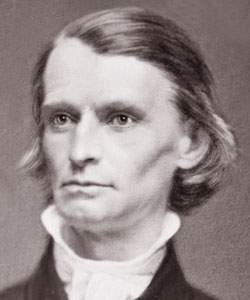Henry Alexander Wise (Congressional Biographical Directory)
Reference
WISE, Henry Alexander, (father of John Sergeant Wise and Richard Alsop Wise and uncle of George Douglas Wise), a Representative from Virginia; born in Drummondtown, Accomack County, Va., December 3, 1806; was privately tutored until his twelfth year and then entered Margaret Academy, near Pungoteague, Accomack County; was graduated from Washington College, Pennsylvania, in 1825; studied law in Winchester, Va.; was admitted to the bar in 1828 and commenced practice in Nashville, Davidson County, Tenn.; returned to Virginia in 1830; held several local offices; elected as a Jacksonian to the Twenty-third and Twenty-fourth Congresses, as a Whig to the Twenty-fifth through Twenty-seventh Congresses, and as a Democrat to the Twenty-eighth Congress and served from March 4, 1833, until his resignation on February 12, 1844; chairman, Committee on Naval Affairs (Twenty-seventh and Twenty-eighth Congresses); was appointed Minister to France in 1843, but was not confirmed; Minister to Brazil 1844-1847; delegate to the State constitutional convention in 1850; Governor of Virginia 1856-1860; delegate to the Virginia Convention, 1861; served in the Confederate Army during the Civil War; resumed the practice of law in Richmond, Henrico County, Va.; served on the commission to fix the boundary line between Virginia and Maryland; died in Richmond, Va., September 12, 1876; interment in Hollywood Cemetery.
"Wise, Henry Alexander," Biographical Directory of the United States Congress, 1774 to Present, http://bioguide.congress.gov/scripts/biodisplay.pl?index=W000649.
Henry Alexander Wise (Simpson, 1985)
Scholarship
Wise always believed that few exceeded his commitment to Virginia and the South during the secession crisis and the Civil War. Like many Southerners, he wished to be known as a man of peace who abided by the decision of his people and reluctantly took up arms. There was no ordinary reticence in him, however. He never wanted to argue the case for either secession or war because he thought each unprovable and therefore unwinnable. But if his decisions were thus hard ones, there was little chance of his forsaking the cause of Southern independence altogether, as Senators James H. Hammond of South Carolina and John Bell of Tennessee at least contemplated. Wise’s prevarications help to explain, in ways he never acknowledged, both the intensity of his commitment to political revolution and the wavering of his loyalty.
If Wise was not wholly committed to secession, neither did his decision result from disentanglement in the “relentless, horribly logical meshing of ears within” the political mechanism that “dictated an almost certain outcome” during the winter of 1860-61. To be sure, Wise’s maneuverability was diminished as a result of changes in the political structure. But as Barrington Moore, Jr., writes, “The uncertainty of all actors is one of the most significant and neglected aspects of historical crises, great and small.” Options remained open and potential outcomes appeared hazardous and unclear until very late. Secession startled and surprised him.
If Wise was not wholly committed to secession, neither did his decision result from disentanglement in the “relentless, horribly logical meshing of ears within” the political mechanism that “dictated an almost certain outcome” during the winter of 1860-61. To be sure, Wise’s maneuverability was diminished as a result of changes in the political structure. But as Barrington Moore, Jr., writes, “The uncertainty of all actors is one of the most significant and neglected aspects of historical crises, great and small.” Options remained open and potential outcomes appeared hazardous and unclear until very late. Secession startled and surprised him.
Craig M. Simpson, A Good Southerner: The Life of Henry A. Wise of Virginia (Chapel Hill: The University of North Carolina Press, 1985), 219.





